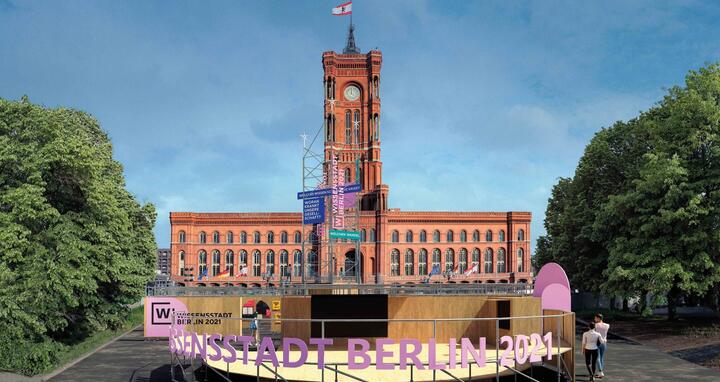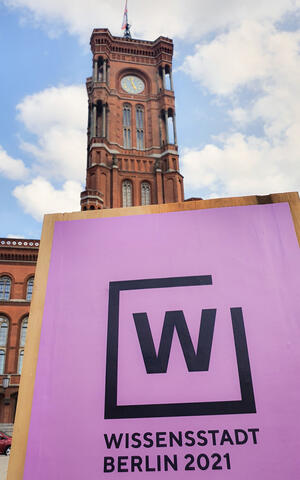Wissensstadt Berlin 2021: Experience the future of medicine
With the motto “Berlin will es wissen” (“Berlin wants to know”), over 30 science institutions in the German capital will invite Berliners and their guests to a research festival in the square in front of the Rotes Rathaus from Saturday 26 June 2021. Researchers will engage in dialogue with the public and bring science to life with panels discussions, interactive experiments, games, workshops, readings and performances, as well as an open-air exhibition. The three main topics will be climate, health and our coexistence.
The Max Delbrück Center for Molecular Medicine in the Helmholtz Association (MDC), a health research centre, will be part of Wissensstadt Berlin 2021. Commenting on the opening this Saturday, Professor Thomas Sommer, (acting) Scientific Director of the MDC, said: “Berlin boasts state-of-the-art biomedical research. We are young, international and dynamic. We want to showcase this at Wissensstadt 2021 and invite people to get involved.”
And commenting on the MDC's programme, Professor Heike Grassmann, Administrative Director of the MDC, added: “We see it as an excellent opportunity to show how exciting science is. We're looking forward to interacting with Berliners.”
Our main areas of focus in a nutshell:
PANEL DISCUSSIONS
- Helmholtz – a giant in science
The research conducted by Hermann von Helmholtz led to groundbreaking findings in medicine, meteorology and physics. Hermann von Helmholtz’s accomplishments are still hugely beneficial to this day. Philosopher of science Professor Gregor Schiemann and medical scientist Professor Simone Spuler from the MDC will be discussing this topic.
(An event by the Helmholtz Association of German Research Centres and publishing house wbg Theiss)
1 July 2021, 6 p.m. on the central stage in front of the Rotes Rathaus. Tickets required.
- The dream of a Berlin-based ‘cell clinic’ and the desire to treat diseases before they emerge
Single-cell technologies can be used to divide organs or tumours into individual cells, measure their gene activity and, with the aid of supercomputers and artificial intelligence, reassemble the individual cell analyses into a whole organ or organism. Single-cell analyses hold tremendous significance for personalised medicine. Professor Nikolaus Rajewsky (MDC), Professor Christopher Baum (Berlin Institute of Health in Charité), Professor Simone Spuler (MDC and Charité / ECRC) and Dr Denes Hnisz (Max Planck Institute for Molecular Genetics) will be speaking about the opportunities that they open up.
1 July 2021, 7.30 p.m. on the central stage in front of the Rotes Rathaus. Tickets required.
OPEN-AIR EXHIBITION
How do we turn knowledge into health? Medicine at the cellular level
The large open-air exhibition in front of the Rotes Rathaus will offer answers to key questions that concern us all. It aims to inspire, inform and encourage discussion.
The MDC is dedicating the exhibition to the medicine of the future and will ask the following questions: When do cells make bad decisions and when do diseases emerge? What potential do organoids (artificial mini-organs made in a lab) have? And is it possible to identify and stop diseases in their tracks before they emerge?
26 June to 22 August 2021 in the square in front of the Rotes Rathaus
KNOWLEDGE SHOW “REAL OR FAKE?”
At this quiz show researchers will be reporting on the latest research and also drawing attention to the fact that scientific findings can be manipulated. “Real or Fake” will raise awareness of targeted misinformation or possible misinterpretation of facts. (Show with the association Besser Wissen e.V.)
9 July 2021, 4.30 p.m. on the central stage in front of the Rotes Rathaus. Tickets required.
MDC activity booth
Be it games, pipetting, photography or contests with scientists, the MDC activity booth will provide entertainment for the whole family. Visitors can look forward to the scientific image contest, laboratory Olympics, selfie booth in the MDC lab and talks with researchers about COVID-19, cancer medicine and careers in biomedicine.
2 and 9 July 2021, 3 to 8 p.m. at the booth in front of the Rotes Rathaus.
Further information
- All MDC events for Wissensstadt can be found here.
- The full programme of Wissensstadt Berlin 2021 is available here.
- The programme for the campus in Berlin’s Buch district is available here (available only in German).
Contact:
Jutta Kramm
Head of Communications
Max-Delbrück-Centrum für Molekulare Medizin in der Helmholtz-Gemeinschaft
0 30 9406-2140
jutta.kramm@mdc-berlin.de oder presse@mdc-berlin.de
- Max Delbrück Center for Molecular Medicine in the Helmholtz Association (MDC)
-
The Max Delbrück Center for Molecular Medicine in the Helmholtz Association (MDC) is one of the world’s leading biomedical research institutions. Max Delbrück, a Berlin native, was a Nobel laureate and one of the founders of molecular biology. At the MDC’s locations in Berlin-Buch and Mitte, researchers from some 60 countries analyze the human system – investigating the biological foundations of life from its most elementary building blocks to systems-wide mechanisms. By understanding what regulates or disrupts the dynamic equilibrium in a cell, an organ, or the entire body, we can prevent diseases, diagnose them earlier, and stop their progression with tailored therapies. Patients should benefit as soon as possible from basic research discoveries. The MDC therefore supports spin-off creation and participates in collaborative networks. It works in close partnership with Charité – Universitätsmedizin Berlin in the jointly run Experimental and Clinical Research Center (ECRC), the Berlin Institute of Health (BIH) at Charité, and the German Center for Cardiovascular Research (DZHK). Founded in 1992, the MDC today employs 1,600 people and is funded 90 percent by the German federal government and 10 percent by the State of Berlin.





